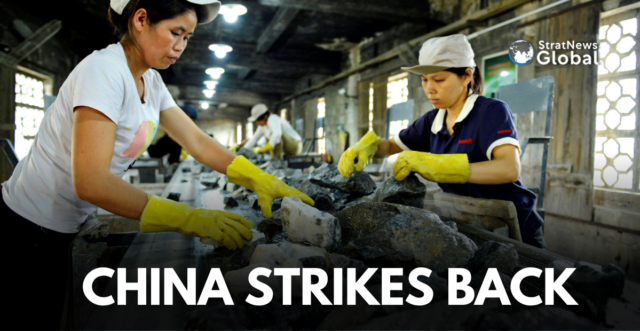China said on Tuesday it would restrict exports of five metals used in defence, clean energy, and other industries in response to fresh US tariffs, refraining from the outright export bans Beijing has previously used against Washington.
The restrictions were the latest attempt by China since 2023 to leverage its dominance in mining and processing critical minerals used in everything from smartphones and electric car batteries to infrared missiles and ammunition.
The new curbs by China stop short of outright export bans and are narrowly targeted in some cases. They form part of the measured package of tariffs and other policies unveiled by Beijing after an additional 10% tariff on Chinese imports into the US came into effect at 1201 ET (0501 GMT).
License Required
The Commerce Ministry said licences will now be required to export 20 tungsten, tellurium, bismuth, indium, and molybdenum-related products to “safeguard national security interests.” The metals are used in everything from solar panels to artillery shells.
For example, China will restrict the export of certain types of molybdenum powders used to make missile parts. It shipped 287 tons last year, about half going to Japan, customs data showed.
Markets had speculated China would expand export controls ever since its decision last December to ban exports to the U.S. of antimony and other materials, according to Jessica Fung, head of Consulting at Project Blue.
The move will likely force up prices outside China, she added.
However, a London-based trader, who requested anonymity as they were not authorised to speak to the media, said the move was a “warning shot” and there wouldn’t be a big impact on markets as alternative sources exist.
Indices which track a tungsten compound APT-CHINA and indium prices outside China IND-ING-LON hit their highest levels in a decade or more in late January before these curbs were announced.
Sudden Stop, Slow Recovery
After previous export curbs were imposed on other metals, exports dropped sharply as companies scrambled to get export licences, a process that takes roughly six weeks.
In the past, shipments slowly rebounded as licenses were granted, although in the case of germanium, exports are still considerably below pre-restriction levels.
However, it remains to be seen whether shipments destined to the U.S. will qualify for licences. The United States stopped mining tungsten in 2015 and has not produced refined bismuth since 1997, relying in both cases on imports.
(with inputs from Reuters)





